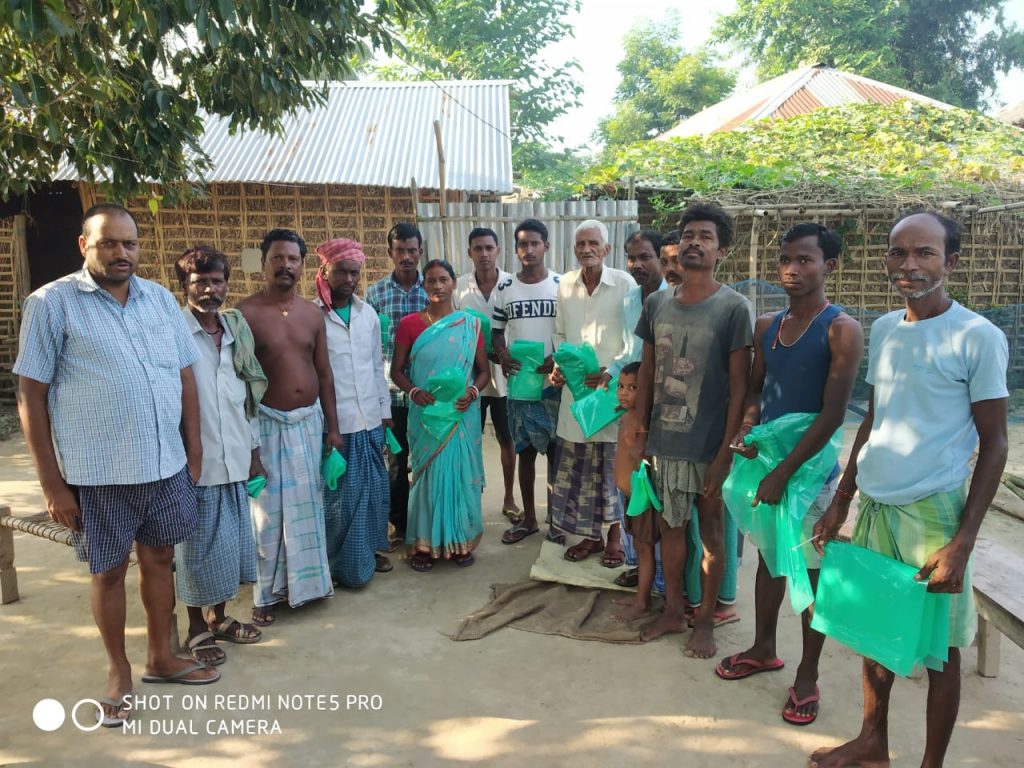Tackling Postharvest Food Loss in India
This article was authored by Rohini Kashimshetty (ADM) and was originally published on the ADM website on September 29, 2020.
According to estimates by the Food and Agriculture Organization, 14% of the food that is produced around the world is lost across the supply chain from the postharvest phase up to the retail stage when it is consumed. Studies have also shown that as much as 60% of cereal grains such as wheat, maize, and rice, which are staple foods in many developing countries, can be lost during the postharvest storage phase due to a lack of efficient technologies, storage infrastructure and awareness of proper storage methods.
In the Indian state of Bihar, where there is widespread poverty and 77% of the population is engaged in agriculture, postharvest loss is a significant concern, which not only affects food availability and the livelihoods of smallholder farmers, but also the environment. When food is lost either due to a loss in quality or quantity, the land, water, and energy resources that went into making the food are also wasted.
In effort to tackle food loss in Bihar, the ADM Institute for Postharvest Loss Prevention (ADMI) at the University of Illinois partnered with the Borlaug Institute of South Asia, Dr. Rajendra Prasad Central Agricultural University, and Bihar Agricultural University on the Government of Bihar’s Climate Smart Village project to introduce postharvest technologies as part of building resilience to climate change. In 2019, the project began promoting the use of hermetic bags, which are produced locally in India, easy to use and seal, enabling farmers to store their harvested grain safely. This simple yet effective innovation keeps grain dry and free from insects, pests, and aflatoxin producing fungi to improve both the quality and quantity of the harvest.
Combatting food loss amid the COVID-19 pandemic
But as the project got underway, the emergence of COVID-19 created additional challenges, while highlighting the critical need for improvements in postharvest storage. The strict lockdown in India caused disruptions in the supply chain, delaying this year’s harvest due to labor shortages and transportation restrictions, making it more difficult for farmers to access markets and leaving them with a larger than usual amount of harvested grains in need of safe storage. The hermetic bags provided an effective and simple way to navigate these challenges.
Before the pandemic, field investigators had already visited several farming communities to introduce the hermetic storage bag and explain how they work. While COVID-19 made it harder for the investigators to distribute the bags, they persisted. By adhering to safety protocols and taking the necessary precautions, they visited household clusters in villages to safely distribute hermetic storage bags. So far, 6,300 bags have been allocated to 25 villages, which roughly translates to 2 – 3 bags per household.
With the pandemic occurring at the same time as this year’s wheat and maize harvest, and coinciding with early and heavy rains in April, it was also harder to dry harvested grains. To combat these additional challenges, the smallholder farmers were given free access to low-cost BAU-STR dryers to help them properly dry the grains before storing them in hermetic storage bags. These locally made dryers were designed by an ADMI-funded project at the Bangladesh Agricultural University in Bangladesh and were adapted to the specific geographical context in India.
Using digital technology to drive progress
To accelerate their efforts amid the challenges of COVID-19, the project’s field investigators adopted a digital approach through the use of WhatsApp. The application is widely used in India and has a high rate of adoption among farmers. By creating WhatsApp groups, field investigators were able to continue to reach out to the farmers to provide more useful information on improving grain storage. At the same time, farmers were able to ask questions to receive further support. The success of the digital approach is expanding the use of WhatsApp more broadly to develop resources to continue engaging and supporting farmers with more guidance.
ADMI is currently in the process of expanding their work in India by partnering with a major private sector partner in India, who has developed a digital platform connecting retailers with farmers, to make the hermetic storage bags more widely available. With each retailer connected to anywhere between 100 to 10,000 farmers, this public-private partnership has the potential to bring new innovations to further benefit the farmers and address food loss.
“Many innovations and technologies exist that could dramatically reduce postharvest loss even during the disruptions of Covid-19, but those solutions will remain underused until smallholder farmers are aware of their grain losses and the ways to address them and have reliable market access to postharvest technologies,” said Dr. Alex Winter-Nelson, ADMI’s Director. “Our partners in Bihar have succeeded in raising awareness despite the difficulties of farmer outreach during pandemic and our new partnership with online platforms promises to bring appropriate technology to thousands of retailers who could ensure that farmers have access to the solutions they want.”
